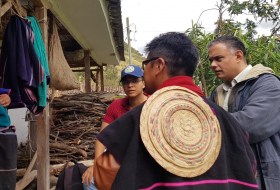News
Faculty of Health Sciences leads research for the benefit of the Misak community
Through three research groups: In Health, Human body movement and quality of life, and Health, Family and Society, we work on a proposal that aims to advance a socio-cultural, clinical, anthropological and functional process with members of the community Misak from Silvia (Cauca) suffering from “osteo-articular” problems, specifically rheumatoid arthritis.
In order to characterize clinically and socio-culturally the community of the Misak people suffering from “osteo-articular” problems, specifically rheumatoid arthritis, the research groups: In Health, Human body movement and quality of life and Health, Family and Society of the Faculty of Health Sciences advance a research process that aims to improve the quality of life of the Misak population of Cauca.
“The study was born through a clinical observation of patients with rheumatoid arthritis who were from the Misak community, given that 22% or so of the population in Cauca are indigenous, they are a very valuable population with which it can work to have many impacts at various levels” explained Ana Isabel Ospina Caicedo, Rheumatologist at San José Hospital and professor at the University of Cauca.
The research project “Anthropological and functional clinical socio-cultural characterization of the community of the Misak people suffering from “osteo-articular” problems specifically rheumatoid arthritis”, raises three stages of development, the first a process of adaptation and validation of the questionnaire of interviews to the local language ( Namtrik) with the intention that the elders can participate, even if their most fluent language is not Spanish. The second stage consisted of the prevalence study where scales were established and questionnaires were applied to the entire population over 18 years of age with the intention of seeking disability conditions or initial symptoms of the disease and reviewing patients who are already diagnosed.
“From the indigenous IPS Mamá Dominga we had the opportunity to interact with the Faculty of Medicine of the University of Cauca with whom we have made an alliance to investigate rheumatoid arthritis, which profoundly affects our Misak population in the Guambia shelter. This disease not only affects the Misak but also populations of other cultures and we want to know why, so we have made a first survey with the team of teachers and students of Unicauca and Misak teachers where 100 surveys were completed which have been satisfactory, ”said Floro Tunubalá, IPS Mamá Dominga manager.
The last stage of the project involves the writing of the analysis of all the information that promotes in other areas the information obtained, so that other groups generate and do the same with their local communities. The above in order to strengthen the community.
The undergraduate and graduate students participating in the research, consider that the experience helps them not only to develop in the clinical aspect, but also allows training in the investigative aspect, “This facilitates the interaction with the indigenous communities, with very rich cultural and ancestral knowledge and it is a learning of side and side, which means that we can help them improve their quality of life when they have the results of this research”.
More Info:
Faculty of Health Sciences
Telephones: 8209870 8209800 Ext. 2717
Email: fsalud@unicauca.edu.co


